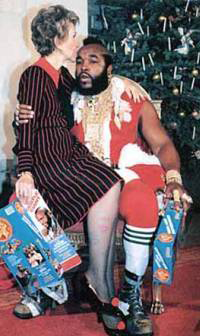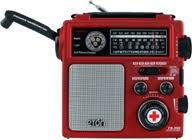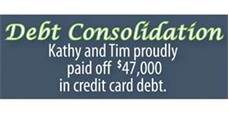Talk radio
Talk radio (alternately, conservative talk radio or other terms dependent on what one calls conservatives, such as patriot talk radio or asshat talk radio) is conversation by radio, as opposed to other popular formats, such as music, static, or complete silence. Talk radio programs involve a commentator, sometimes in-studio guests, and often listeners who phone in.
Talk radio usually is biased toward the right. Left-wing talk radio shows, such as Air America, exist but are biased toward bleeding money until they switch to the alternate format of complete silence.
History
Before talk radio, people who wanted to hold court on ponderous "issues of the day" used a variety of other technologies:

- CB radio was a popular medium for people who wanted to impress their political opinions on total strangers. Ham radio was still another; it traveled more than two miles but required that licensees be tested on arcana such as Morse code, resistor color codes, which way to point antennas, and how not to make airplanes crash. Federal regulations for both services prohibited political discussion (and in fact discussion of most anything, except how good the signal was and the date of the next radio jamboree). However, around elections, radio operators sometimes snuck in their personal views. They would make this conversation cryptic, confident that other radio operators would get the point and regulators would not.
- The BBS was an advance when the computer era began. Operators would type instead of speak, which was much less efficient. But it was advanced. Political opinions were welcome on a BBS, and in fact many BBS's were set up to air such opinions. These days, people who want to communicate so inefficiently use IRC. They avoid outrageous telephone charges, instead paying outrageous Internet access charges. This is advanced too.
- The telephone is also a method of communicating subversive political opinion. However, phoning up complete strangers to give them a piece of your mind quickly fell out of favor. (This is why the trees in the front yard of Alexander Graham Bell were toilet-papered so often.) It came back into fashion with the advent of telemarketing.
Rush Limbaugh invented talk radio in 1984, much as Henry Ford had invented transportation. Limbaugh had bounced from the employ of the Kansas City Royals to music radio stations and had not made a mark for himself, probably because none of his employers shared his view that unsolicited expression of his own political opinion was part of the job. (Compare the excuses from recipients of Permanent Disability on why they can't find steady work.) Limbaugh created an industry where the customer would receive a piece of his mind. He went national in 1988 and dozens of imitators started shows to give the customer a piece of Limbaugh's mind.
Talk radio today
Talk radio is now the conservative counterpart to the liberal cable news networks and large East-coast newspapers. Talk radio spends most of its time lamenting the bias of those media. When the listener points out that talk radio has a comparable bias in the other direction, the host has an instant fallback argument. Those other media claim they are in the news business. We are merely entertainers. They are mislabeled but we are not.
Franchises
Talk radio shows are franchised onto dozens of local radio stations. These stations may be FM, where the signal fades out when you drive out to the belt-line highway; or AM, where it is instead pleasantly mixed with forty other stations.
They reach only listeners who are right downtown, and yet have nothing better to do than listen to the radio, nor any access to a computer. They feature local voice-over guys promoting the shows who never actually listen to them and who seem to hate the hosts.
Station owners
Station owners are like owners of yachts and baseball clubs. They have money to burn, and they hope that sinking money into new gadgetry will make their annual losses "sustainable," as international bankers say when offering advice to Greece. The owner's goal (again, comparable to a ball club) is to convert a large amount of money directly into prestige in the community.
Given that the typical station owner has not thought far enough to know what content he wants to broadcast over his new toy, many jump at the chance to air a talk radio program.
Advertising
Talk radio works on the "advertising model," where the listener receives the broadcast for "free" (based on the maxim that free advice is worth every penny) but is maneuvered into listening to advertisements. The radio station collects money from the advertisers. It claims to be serving the listener, but in fact is serving him up.
The following industries advertise on talk radio:
- Male enhancement and other mail-order pharmaceuticals. We have a registered pharmacist standing by (or at least a website written by one) and we will evaluate your personal condition and recommend the perfect dosage right after you provide your credit-card number to the people in our boiler room.
- Credit counseling. If you owe more than $20,000 to the IRS (or can prove in several other ways that you have completely bollixed up your personal finances), we will be able to, mmm, "help" you. Remarkably, few of these services are operated by Nigerian princes.
- Car dealers, cell-phone dealers, and bankers. Through the magic of radio, the ponderous disclaimers required to keep their pitches almost truthful can be recited at faster-than-human speeds and take up only a tiny bit of a 30-second spot.
Unfortunately, the typical small-town station owner—who, as described above, has not thought about the actual content he will broadcast—has neither thought about the need to hire ad salesmen. So he mostly runs public-service ads. You get them for free and they help when it's time to posture about your diligent community service for your license renewal. Listeners who tuned in to hear criticism of Barack Obama instead hear, during every commercial break, Michelle Obama nag them to get off their lard-asses and do sit-ups.
Commercial breaks

The talk radio format is built around 14 minutes of commercials during each hour of programming. (Networks sometimes tease that they are going to reduce this amount. But, as in many other fields, the purpose of teasing is to never have to put out.)
The 14 minutes is structured as follows:
- A "hard break" at the bottom of the hour has 4 minutes of commercials. It used to be only on Channel 4 in Britain that the audience could be conned into sitting through 4 minutes of froth to reach content it actually wanted. Innovative talk hosts go with 5-minute and 6-minute commercial breaks. One might think they hold their audience in contempt, but that would be like controversy, and there is no controversy in talk radio.
- There is another 4-minute "soft break" during the first half of the hour. It is called a "soft" break because the host can vary the time at which it occurs. This doesn't keep the host from hanging up on a caller or on an invited guest because "I'm up against a break."
- There is another one in the second half of the hour; also, because listeners have been lulled into submission, a 2-minute break to achieve the total of 14 minutes. These are both "soft" breaks and, like the other "soft" ones, can be used to ditch callers. No one knows which break is the 4 and which is the 2. If listeners simply tune out for 4 minutes each time, they could miss key details on exactly how that new bridge to Canada means the end of America as a nation.
The host often delays the final "soft" break for so long that the final segment is ten seconds long. During this segment, the host at most tells what's going to happen next hour, and might only repeat a slogan or reintroduce himself. Listeners have sat through four minutes of simulated digestive noises, shouting pitch-men, and bad singing to get them to donate their cars to benefit orphans, for this cherry nougat that is nothing but pit. And they'll do it again next hour.
But wait! there's more!
Subtracting the top-of-the-hour break for Fox News (with its own commercial breaks) would leave about 40 minutes per hour for the stuff you want to hear. Only, you are not the biggest fish the host has to fry. To-wit:
- His nationwide tour is coming to your city, and you can buy tickets to the show at the local civic center, and see him in person say the exact same things you hear him say on the radio every weekday. (Most listeners don't really want to see him but to be seen seeing him.)
- His vanity Internet video business is all but going viral—the one he started after walking away from the lucrative gig on national cable TV after a dispute over first principles—but only if you get involved now!
- There is also his latest book, which is surging up the charts, or would be, except that the damned New York Times won't review it.
- And there is an ever-changing set of side businesses. Lapel pins and bumper stickers will identify you as a talk-radio listener (though oddly, you have to buy them; the host doesn't pay you to advertise his show). And a line of apparel, after-shave lotions, and perhaps teas are designed exactly for people who share your political opinions.
Once all the commercials are done, the host proceeds to important topics like identity theft and the nation's poor awareness of its heritage. Only, he is still selling. There are remedies for each of these problems, and each is as close as dialing 1-800 something.
Finally we have gotten through all that, and there is a good 20 minutes left for the meat of the program, which is an advertisement for the Republican Party.
Guests
Guests appear on talk shows either in-studio or by phone. Two things are true about each guest:
- He is a noted conservative commentator on national issues with acerbic wit.
- He has just written a brilliant new book.
It is left to the reader which of the above facts is the basis for his appearance on the talk show. (Could you give us the book's full title again?) The book breaks new ground on the political scene, exposes one scandal per chapter, and tells you a multitude of things that they don't want you to know. (We can buy it through Amazon, I suppose?) The talk host asks the author a flurry of questions whose answers are in the book. These questions make it obvious that the talk host has browsed the book's Table of Contents and maybe the bibliography, not just read the dust jacket. (And the book's name is, again?)
The author appears on small-town radio, even though there is no green room with buffet but perhaps packets of cheese-and-crackers, for one reason: It is a condition of the publisher's willingness to publish yet another endless tome on how Barack Obama was born in Kenya with a butt-chip installed by which a cabal would induce him to sabotage America. When the book is out in paperback, he will be back on the show. Maybe the host will have read it by then.
Talk hosts, of course, also have acerbic wit, and they write brilliant new books of their own. When they do, they declare short truces and become guests on one another's shows.
Audience

The audience of talk radio is unique and with important differences from the audience for cable news. Just ask them. Cable news viewers are fundamentally couch potatoes, passively splayed in front of their televisions and soaking up misinformation with mouth gaping and eyes glazed-over.
Talk radio listeners, by comparison, have active minds. They don't just unquestioningly take in the host's interpretation of the day's events. Rather, their hands are busy pursuing constructive activities. These may include organizing their collections of vacuum tubes, or rubbing a worry stone. With the magic of the portable radio, they may be outdoors, whitewashing the picket fence, snapping at nearby children, adjusting the leg-hold traps to catch the neighbor's dog the next time he comes to take a dump in the yard, or hammering campaign signs into the lawn. They may also listen to talk radio in the car, as they drive downtown to count their money.
Talk radio listeners concede that newspaper readers have the most active minds of all. They hold paper in their hands and devote their entire attention to it. (But they no longer program computers with punch cards.) They are able to operate pens and pencils, and thus can relax with crosswords rather than bonbons. Talk radio listeners especially esteem people who subscribe to multiple newspapers to get different viewpoints, like the New York Times and the Boston Globe. Listeners themselves are satisfied that they get enough diversity listening to both Limbaugh and Glenn Beck.




